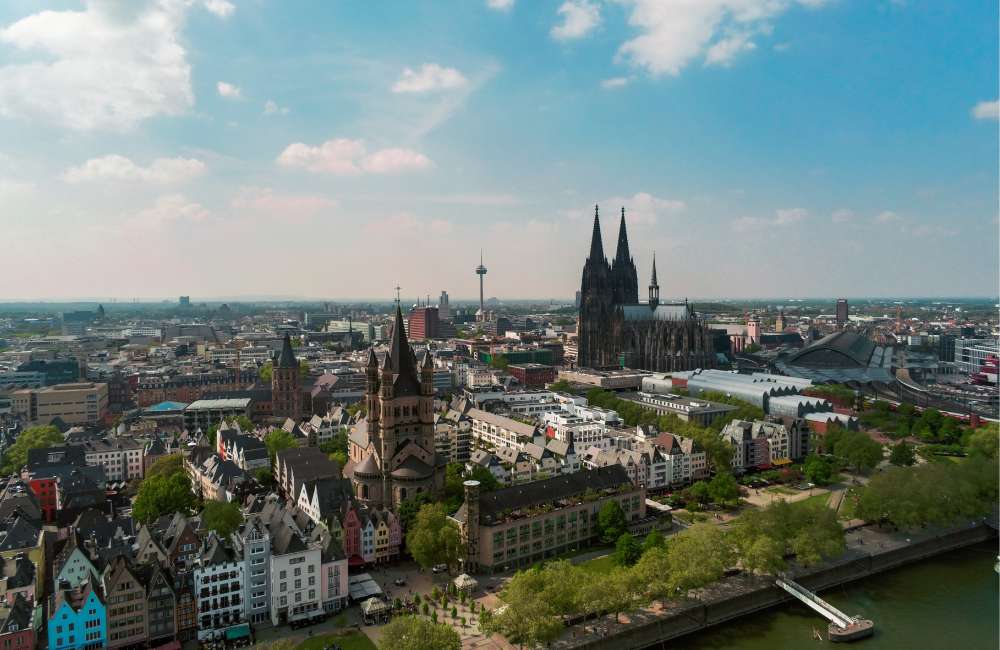Is Germany a Third World Country?
No! As a German myself, I can confirm that Germany is not a third world country.
Yet, there are still some people out there who might believe this to be true. Perhaps, it’s due to a lack of knowledge about Germany’s economy, political stability, and social welfare system.
Or maybe it’s because they are confusing Germany with another country. Whatever the reason may be, it’s important to clear up any misconceptions about Germany’s status as a developed nation.
In this blog post, we’ll take a closer look at Germany’s economic and social landscape to understand why it’s not a third world country.
What is a First World Country?
To understand why Germany is not a third world country, it is important to understand the concept of a first world country.
The term “first world” was originally used during the Cold War era to describe countries aligned with NATO and the Western Bloc. These countries were characterized by their political and economic stability, high standards of living, and strong economies.
Today, the term “first world” is not used as frequently. It is generally used to describe developed countries with advanced economies and high standards of living.
These countries typically have well-established infrastructure, strong social welfare systems, and high levels of education and technological development.
What is a Third World Country?
The term “third world” was originally used during the Cold War era. It refered to countries that were not aligned with either the Western or Eastern blocs. These countries were often characterized by political instability, underdeveloped economies, and social inequality.
Today, the term “third world” is considered outdated and can be seen as politically incorrect. However, the term “developing country” is often used to describe countries that are still in the process of industrialization and are working to improve their economies and standards of living.
Developing countries often face challenges such as poverty, low levels of education and healthcare, political instability, and inadequate infrastructure. They may also be vulnerable to natural disasters, conflict, and disease outbreaks.
Despite these challenges, many developing countries are making progress in improving their economies and quality of life for their citizens. Some examples of developing countries include countries in Africa, South Asia, and parts of Latin America.

Is Germany a Third World Country
No, Germany is not a third world country. In this blog post, I will answer the most common questions about this misconception.
Is Germany a Third World Country in the strict sense of the term?
No, Germany is not a Third World Country in the strict sense of the term.
The term “Third World” originally referred to countries that were not aligned with either the capitalist first world or the communist second world during the Cold War. However, over time, the term has come to be associated with poverty, underdevelopment, and lack of economic progress.
Germany – on the other hand – is a highly developed country with a strong economy.
Why isn’t Germany a first world country?
Germany is widely regarded as a highly developed and industrialized country. Therefore, it is often classified as a first world country, along with other highly developed countries.
It’s worth noting that while Germany is generally considered a first world country, no single classification system can perfectly capture a country’s level of development.
The following reasons suggest that Germany is a first world country.
1. Germany is a weahlthy country
Germany’s wealth is a primary reason why it is not classified as a third world country.
Third world nations are typically characterized by widespread poverty, where millions of people live in destitution. However, Germany’s people are affluent by global standards, which sets it apart from third world countries.
Germany is one of the wealthiest nations worldwide, with a per capita income of $55,220. On average, Germans are the fourth wealthiest people in the world. This fact is making it clear that Germany is not a third world nation.
While poverty exists in Germany, the overall standard of living for Germans is high. The state provides financial assistance, free healthcare, education access, and housing support to those in need. Even those living in poverty in Germany typically live above the extreme poverty levels commonly found in third world countries.
Given that destitution and extreme poverty are defining features of third world countries, Germany’s lack of these issues due to its wealth and high standard of living is a crucial factor in distinguishing it from third world nations.
2. Germany has a developed economy
Germany’s highly developed economy is another critical factor that distinguishes it from third world countries. Third world nations typically have low economic growth, limited economic outputs, and rely heavily on agriculture as their primary industry.
In contrast, Germany boasts the fourth largest economy globally and the largest in Europe. The German economy is highly developed, making it another reason why the country is not classified as a third world nation.
The German economy is highly diversified, with significant industries. German manufacturing is renowned for its excellence worldwide. The economy’s diversity means that it doesn’t rely on just a few sectors for prosperity, unlike third world nations.
Third world countries are typically underdeveloped, and their economies lack diversification, which often leads to dependence on a single industry or a few sectors. Germany’s highly developed economy and economic diversity distinguish it from third world countries, making it a significant economic powerhouse globally.
3. German has some of the best infrastructures in the world
Germany’s infrastructure is a third critical factor that sets it apart from third world nations.
Third world countries often struggle with poor infrastructure, and utilities that are in poor condition and require significant updating and repair. Access to key utilities such as electricity, water, and heating can also be challenging for many people in third world nations.
In contrast, Germany has one of the best infrastructures globally. The country boasts a renowned road network that connects all towns, villages, and cities. It also has an extensive rail network that facilitates the movement of both people and goods with ease.
Germany’s utilities provide power and water to all households, and it also has a high-speed internet and a high-quality phone network. The country’s well-developed infrastructure is a critical reason why it is not classified as a third world nation.
Infrastructure is a crucial factor for a country’s prosperity. The lack of developed infrastructure is a significant challenge for third world nations. Germany’s infrastructure is often ranked among the best globally. This is yet another reason why it is not classified as a third world country.
4. Germany has a good healthcare system
The excellent healthcare system in Germany is another compelling reason why Germany can not be classified as a third world country.
Third world nations generally have limited resources, making it challenging for governments to provide quality healthcare services across the country. Consequently, people in many third world countries are either unable to access medical assistance or forced to pay private providers if they can afford to.
In addition, healthcare in third world nations is often unevenly distributed, with people in remote and rural areas facing more challenges accessing quality care.
In contrast, Germany has one of the world’s highest quality healthcare systems.
All Germans have access to the medical care they need. The country’s social security system ensures that people on low incomes or without the means to pay can still receive the medical treatments they require.
The healthcare system is also easily accessible across Germany, even in remote and rural locations.
Germany’s child mortality rate is remarkably low, with only 3.2 deaths in every 1,000 births. This rate is significantly lower than that of many third world nations.
Additionally, Germany’s life expectancy is relatively high, with an average of 80.9 years. Third world nations’ life expectancy is generally below 65.
The high-quality and accessible healthcare system in Germany is a critical factor that sets it apart from third world nations. This is why it is not classified as a third world country.
5. Germany children receive quality education
Another factor that reinforces Germany’s status as a non-third world country is its exceptional education system.
In many third world countries inadequate resources hinder the provision of quality education. In contrast, Germany offers free education to all children between six and eighteen years of age, with a guarantee of equal access to education for all.
Germany has one of the best education systems worldwide, with renowned universities. The state subsidizes higher education, making it affordable for young people in the country.
In contrast, millions of children in third world countries lack access to education, and those who do often receive inadequate teaching.
The fact that every German child has access to quality education, combined with its top-rated higher education sector, further demonstrates why Germany cannot be classified as a third world country.
6. Germany is a democracy
Germany’s status as a non-third world country is also due to its robust democratic system.
In many third world countries, the establishment and maintenance of democratic systems of government are challenging. The lack of transparent and accountable institutions and the absence of the rule of law are common characteristics of third world countries.
In contrast, West Germany has been a thriving democracy since 1949, with democratic institutions that developed quickly after World War Two. When Germany was reunited in 1990, democracy was extended to the East of the country.
Over the last seventy years, most of Germany has upheld strong democratic principles.
Although Germany has had a history of authoritarian governments, it is now an exemplar of modern liberal democracy. This strong democratic foundation is a significant reason why Germany is not a third world country.
7. Germany is a stable country
Another key factor that distinguishes Germany from third world countries is its stability.
Third world countries often face political and economic instability, and lack the resources to address crises. They are also more vulnerable to natural disasters, conflicts, and humanitarian crises.
Additionally, external interference is common, with foreign powers often involving themselves in the affairs of these countries.
In contrast, Germany is a highly stable nation. Although protests, industrial disputes, and political disagreements occur, they do not disrupt the functioning of the state. The country is adept at resolving its issues through dialogue and democratic processes. Germany is not at risk of falling into civil conflict or being invaded or heavily interfered with by other countries.
The stability of Germany as a nation is a significant reason why it is not a third world country.
What type of world country is Germany?
Germany is widly considered to be a first world country.
It has a highly industrialized economy and is the largest economy in the European Union. Germany is known for its strong manufacturing sector, particularly in the areas of automobiles, machinery, and chemicals. It also has a thriving service sector, including finance, insurance, and tourism.
Is Germany a first world country?
Yes, Germany is wildly considered to be a first world country.
The terms “first world,” “second world,” and “third world” were originally used to describe political and economic alliances during the Cold War era. However, today these terms are considered outdated and can be seen as politically incorrect.
Therefore, it is more appropriate to describe Germany as a developed country or a high-income country.
Was Nazi Germany a third world country?
The term “third world country” was not in use during the period of Nazi Germany.
The term emerged after World War II to describe countries that were not aligned with either the capitalist West or communist East during the Cold War.
However, based on the commonly understood characteristics of third world countries, Nazi Germany would not be considered a third world country. At the time, Germany was a powerful and industrialized nation with a strong economy and military. The government had significant resources at its disposal and was able to launch an aggressive military campaign across Europe.
Furthermore, Nazi Germany was a totalitarian dictatorship, where the government held complete control over all aspects of society, including the economy, media, and individual freedoms. This is in contrast to the typical lack of centralized government control and institutional weakness often found in third world countries.
Overall, while Nazi Germany may not fit neatly into any specific classification of nations, it would not be considered a third world country based on the commonly understood characteristics of the term.

Is Germany a Third World Country? – Final Thoughts
It is inaccurate and inappropriate to consider Germany a third world country.
While Germany faces its share of challenges, such as economic inequality and political polarization, it is a highly developed and prosperous country with a strong economy, excellent infrastructure, and a high standard of living.
The term “third world” originated during the Cold War to refer to countries that were not aligned with either the capitalist first world or the communist second world. It is an outdated and simplistic concept that does not reflect the complexity and diversity of modern nations.
Germany, as a member of the European Union and one of the world’s largest economies, is a significant player on the global stage. It has a rich history and culture that continue to shape its present and future.
23 Best Things to Eat at Cologne Christmas Market [Locals Pick]
WONDERING WHAT TO EAT AT COLOGNE CHRISTMAS MARKET? You’ve landed on the right article. I’m…
15 Things to Do in Cologne at Christmas
ARE YOU WONDERING WHAT TO DO IN COLOGNE AT CHRISTMAS? You’ve landed on the right…
20 Unusual Things to do in Cologne Germany
ARE YOU LOOKING FOR UNUSUAL THINGS TO DO IN COLOGNE GERMANY? Then you’re in the…
Best Free Walking Tour Cologne in 2023 [Locals Pick]
LOOKING FOR THE BEST FREE WALKING TOUR IN COLOGNE? You’ve landed on the right article….
Mixed Sauna in Germany – All you need to know
ARE YOU INTERESTED IN GERMAN SAUNA CULTURE? You’ve come to the right place! I’m from…
BEST 5 Stars Hotels in Cologne, Germany
ARE YOU LOOKING FOR THE BEST 5 STARS HOTELS IN COLOGNE GERMANY? You’ve landed on…
- 23 Best Things to Eat at Cologne Christmas Market [Locals Pick] - 18. October 2023
- 15 Things to Do in Cologne at Christmas - 11. October 2023
- 20 Unusual Things to do in Cologne Germany - 6. September 2023











